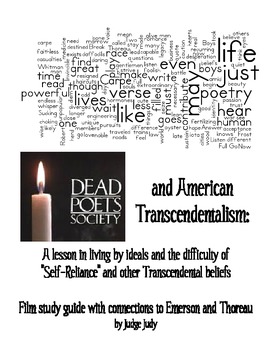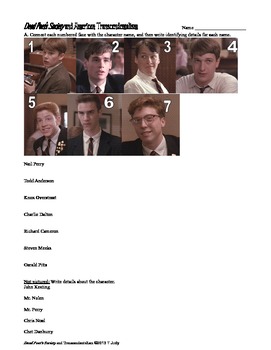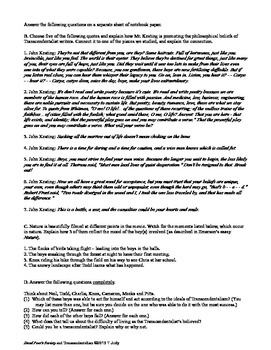Dead Poet's Society and Transcendentalism
Judge Judy
11 Followers
Grade Levels
10th - 12th
Resource Type
Standards
CCSSRL.11-12.1
CCSSRL.11-12.2
CCSSRL.11-12.3
CCSSRL.11-12.9
CCSSSL.11-12.1
Formats Included
- PDF
Pages
6 pages
Judge Judy
11 Followers
What educators are saying
This was great! It was a perfect way to end my Transcendentalism unit and really helped students see the connections and apply the principles we had discussed.
An excellent resource for a different mindset, to changeup the lesson. My students greatly enjoyed these learning activities. They fit right in with the lessons perfectly. Thanks again for this.
Description
This is a film guide to use as a culmination of study on the American Transcendentalists. Students need to have studied "Self-Reliance" and "Nature" by Emerson and "Civil Disobedience" by Thoreau (or excerpts of these pieces from a textbook) and preferably bits of Walden to complete the tasks required.
The student characters in the film all try, to differing degrees, to follow the ideals of non-conformity, self-reliance, non-violent protest, reverence for nature and a respect for personal experience over "learning." All of these are important messages the Transcendentalists idealized. They are ideals though, not practical living advice, as the characters learn through the film. This guide has students identify the characters for clarity, analyze quotations from the main character that sum up these ideals, analyze the use of nature in the cinematography to reflect human emotion as in "Nature" and to decide which, if any, of the boys are able to live by these lofty ideals the Transcendentalists proposed.
Students will show an understanding of the major tenants of Transcendentalism in the analyses and must reflect in the end on the difficulty of living by ideals especially the ideas of Self-Reliance and Civil Disobedience - leading to the short-lived nature of this movement, and later the 1960's hippie movement that borrowed many of its principles.
An answer key is included for easy recall, but is not all inclusive in its answers since these are more open-ended analysis than factual recall.
This lesson addressed Common Core ELA standards RL1, 2, 3, 9, RI 1, 2, 3, 9, SL 1, 4
(I consider the Transcendental texts that are the basis of this lesson to be informational text and the film to be literature)
The student characters in the film all try, to differing degrees, to follow the ideals of non-conformity, self-reliance, non-violent protest, reverence for nature and a respect for personal experience over "learning." All of these are important messages the Transcendentalists idealized. They are ideals though, not practical living advice, as the characters learn through the film. This guide has students identify the characters for clarity, analyze quotations from the main character that sum up these ideals, analyze the use of nature in the cinematography to reflect human emotion as in "Nature" and to decide which, if any, of the boys are able to live by these lofty ideals the Transcendentalists proposed.
Students will show an understanding of the major tenants of Transcendentalism in the analyses and must reflect in the end on the difficulty of living by ideals especially the ideas of Self-Reliance and Civil Disobedience - leading to the short-lived nature of this movement, and later the 1960's hippie movement that borrowed many of its principles.
An answer key is included for easy recall, but is not all inclusive in its answers since these are more open-ended analysis than factual recall.
This lesson addressed Common Core ELA standards RL1, 2, 3, 9, RI 1, 2, 3, 9, SL 1, 4
(I consider the Transcendental texts that are the basis of this lesson to be informational text and the film to be literature)
Total Pages
6 pages
Answer Key
Included
Teaching Duration
3 hours
Report this resource to TPT
Reported resources will be reviewed by our team. Report this resource to let us know if this resource violates TPT’s content guidelines.
Standards
to see state-specific standards (only available in the US).
CCSSRL.11-12.1
Cite strong and thorough textual evidence to support analysis of what the text says explicitly as well as inferences drawn from the text, including determining where the text leaves matters uncertain.
CCSSRL.11-12.2
Determine two or more themes or central ideas of a text and analyze their development over the course of the text, including how they interact and build on one another to produce a complex account; provide an objective summary of the text.
CCSSRL.11-12.3
Analyze the impact of the author’s choices regarding how to develop and relate elements of a story or drama (e.g., where a story is set, how the action is ordered, how the characters are introduced and developed).
CCSSRL.11-12.9
Demonstrate knowledge of eighteenth-, nineteenth- and early-twentieth-century foundational works of American literature, including how two or more texts from the same period treat similar themes or topics.
CCSSSL.11-12.1
Initiate and participate effectively in a range of collaborative discussions (one-on-one, in groups, and teacher-led) with diverse partners on grades 11–12 topics, texts, and issues, building on others’ ideas and expressing their own clearly and persuasively.




